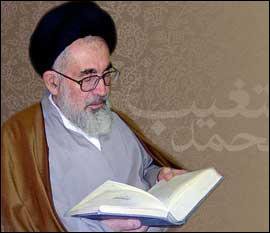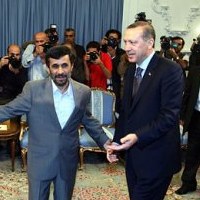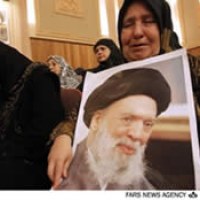![]()
Sun, Oct 10, 2010 | The Meir Amit Intelligence and Terrorism Information Center
Iranian Reformist Cleric Accuses Khamenei of Overstepping His Authorities
Ayatollah Ali-Mohammad Dastgheib, a top cleric affiliated with the reformist bloc, has recently published on his official website (www.dastgheib.com) a religious ruling challenging the regime’s interpretation of the concept of “rule of the religious jurisprudent” (Velayat-e Faqih), which has been in place since the Islamic revolution.
When asked to provide a religious commentary on that concept, the top cleric argued that one must differentiate between the “absolute rule of the religious jurisprudent” and the “religious jurisprudent” who is appointed by the Assembly of Experts.
According to Dastgheib, only in some cases, such as the case of Ayatollah Khomeini, the founder of the Islamic revolution, can one man be both the “religious jurisprudent” and the “absolute religious jurisprudent”. A top Shi’ite cleric can be an “absolute religious jurisprudent” only if he is recognized to possess the religious authority of “source of emulation” (Marja’-e Taqlid). In that case, he enjoys divine authority and has extensive power to manage state affairs as the substitute of the Vanished Imam.
On the other hand, a “religious jurisprudent” appointed by the Assembly of Experts under the constitution rather than as a result of his religious authority, has limited power and may only coordinate between the three branches of government and prevent those branches from violating civilian rights. He has no authority with regard to the people and has no right to meddle in civilian affairs.
It should be noted that current Supreme Leader Ali Khamenei was not recognized as possessing the religious authority of “source of emulation” (Marja’-e Taqlid) after Khomeini’s death in 1989; Dastgheib’s ruling, therefore, is a challenge to his extensive authorities as Supreme Leader.
Dastgheib went on to strongly criticize the Assembly of Experts, claiming that its duties are not limited to appointing and approving the Supreme Leader. It is supposed to help solve the problems facing the civilians and make sure their rights are upheld. It is inappropriate, the top cleric argued, for the Assembly of Experts to elect a leader and then become a body which obeys him, since by doing so it betrays its mission and its responsibility before God and the Iranian citizens.
In the course of the past year, Ayatollah Dastgheib has become one of the most vociferous critics of the Khamenei-led regime among Iran’s top clerics. When the Assembly of Experts convened after the presidential election, Dastgheib demanded that it investigate the conduct of the regime leaders during the election and the riots that broke out after it, and summon the reformist opposition leaders to present their claims.
Last month, Dastgheib refused to take part in an Assembly of Experts’ session. His residence was attacked by a group of government supporters several days later. Dastgheib’s website, as well as the websites of the two top reformist clerics Ayatollah Yousef Sane’i and Ayatollah Asadollah Bayat-Zanjani, have been blocked by the authorities this week.
Last month, Mehdi Karoubi, one of the leaders of the reformist opposition, sent a strong-worded letter to Assembly of Experts chairman Ali-Akbar Hashemi Rafsanjani, demanding that the assembly increase monitoring of the Supreme Leader and the bodies under his direct responsibility and stressing that the assembly has the constitutional power to monitor the Supreme Leader and even remove him from power if it finds him unfit for his duties.
Meanwhile, several news websites affiliated with the reformist opposition have reported this week that Khamenei was forced to cancel his scheduled visit to the city of Qom, the center of Iran’s religious establishment, after several top Shi’ite clerics refused to welcome him. According to the report, Khamenei was supposed to visit the city over the next several days.
Ahead of his visit, the Supreme Leader’s office asked the top clerics of Qom to welcome him or at least take part in the sermon he intended to give during his stay there. When that request was refused by some of the top clerics, it was decided to postpone the visit (Jaras, October 2).
On the other hand, Fars News Agency cited Qom Friday prayer leader Mohammad Saidi as saying that Khamenei’s visit to the city will take place soon and that he will be given a warm welcome by the city residents, the clerics, and the religious seminary students (Fars, October 2).



 RSS
RSS

















Iranian Reformist Cleric Accuses Khamenei of Overstepping His Authorities | #Iran #freeiran #reform #shiism http://j.mp/9fyewq
RT @CrethiPlethi: Iranian Reformist Cleric Accuses Khamenei of Overstepping His Authorities | #Iran #reform #shiism http://j.mp/9fyewq
RT @CrethiPlethi: Iranian Reformist Cleric Accuses Khamenei of Overstepping His Authorities | #Iran #freeiran #reform #shiism http://j.mp/9fyewq